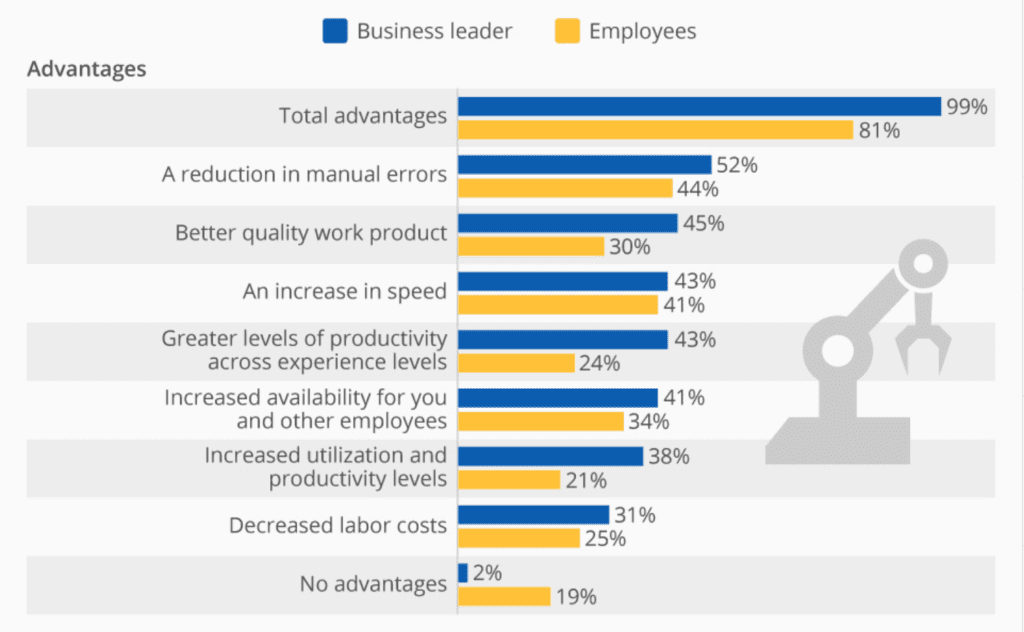
Importance of automation in logistic management system

Automation in business operations is crucial due to its capacity to enhance efficiency and productivity, reduce the chances of human error, ensure consistency, and facilitate data-driven decision-making. By automating repetitive tasks, employees can focus on more valuable activities, leading to higher accuracy and fewer costly mistakes. Furthermore, automation enables businesses to comply with regulations, maintain consistency in processes, and gain real-time insights for better decision-making, thereby enhancing overall business intelligence. In today’s fast-paced business environment, automation is essential for staying competitive and quickly adapting to evolving market demands and customer expectations.
The significance of business automation extends notably to logistic management software which refers to specialized computer programs and tools designed to optimize and streamline various aspects of logistics and supply chain management. These software solutions are instrumental in efficiently managing the movement of goods, inventory, and information within the supply chain. Automated logistic system entails the use of technology, including software applications and hardware devices, to perform tasks and processes with minimal human intervention. It encompasses a wide range of functions, from order processing and inventory management to transportation and warehouse operations.
Here are the advantages that automation in logistics solutions offers:
Efficiency and Productivity Improvement
Automated logistics procedures bring about significant efficiency and productivity improvements benefiting businesses and their customers alike.
- Order Processing: Businesses can significantly reduce processing times, minimize errors, and ensure a high degree of accuracy. This translates into quicker order fulfillment, increased customer satisfaction, and improved overall operational efficiency.
- Inventory Management: Automation in logistics management software ensures that inventory data remains accurate and up-to-date, enabling businesses to make informed decisions regarding stock levels, reordering, and demand forecasting.
- Route Optimization: Automated logistics optimizes transportation routes using data analytics and algorithms, reducing travel time, fuel costs, and resource usage. This not only saves resources but also supports environmental sustainability by reducing carbon emissions.
Reduction in Manual Errors
Manual data entry and processing are susceptible to mistakes, which can lead to costly disruptions in the supply chain. Automated logistics solutions significantly reduce the risk of human errors in logistics processes. It operates with precision and consistency, ensuring that tasks are executed accurately every time. This minimization of errors enhances the overall quality and reliability of logistics operations.
Real-time Tracking and Visibility
Automated logistic management enables businesses to monitor the movement of goods, inventory levels, and the status of shipments in real time. This real-time visibility is invaluable for identifying potential bottlenecks, addressing issues as they arise, and providing customers with accurate and up-to-date information about their orders. It enhances the agility and responsiveness of logistics operations, allowing for better decision-making and improved customer service.
Cost Reduction and Resource Optimization
In the realm of logistics, cost reduction and resource optimization are paramount, and automation within logistics management software plays a pivotal role in achieving these goals. This collectively enhances a company’s financial performance while simultaneously fostering more sustainable and efficient logistics operations.
Labor Cost Savings
Labor Cost Savings
Through automated logistics management tasks such as order processing, inventory tracking, and data entry, businesses can reduce the need for a large workforce. This decrease in labor needs results in significant cost reductions. Moreover, automated systems work tirelessly around the clock, further optimizing labor efficiency and ensuring that operations continue smoothly, even during non-business hours.
Inventory Cost Reduction
Inventory Cost Reduction
Inventory management is a critical aspect of logistics, and automation excels in this area. Through real-time tracking and predictive analytics, automated systems help prevent the costly problems of overstocking and stock-outs. Overstocking ties up capital in excess inventory and incurs storage costs, while stock-outs result in lost sales and dissatisfied customers. By maintaining optimal inventory levels, automation not only reduces carrying costs but also enhances customer satisfaction.
- Fuel and Transportation Cost Optimization
Automation’s role in route optimization is key to curtailing fuel and transportation expenses. By analyzing data and employing algorithms, logistics software can calculate the most efficient transportation routes. This optimization results in reduced travel time, fuel consumption, and overall transportation costs. Furthermore, it contributes to environmental sustainability by curbing carbon emissions and aligning cost savings with eco-conscious practices.
Warehouse Space Utilization
Warehouse Space Utilization
The efficient use of warehouse space is a critical aspect of logistics, especially as businesses expand their operations. Automation aids in optimizing warehouse space utilization by employing data-driven insights. Automated systems can guide inventory placement, ensuring that products are stored in the most space-efficient manner. This not only reduces the need for additional storage facilities but also maximizes the use of existing warehouse space, ultimately resulting in cost savings.
Enhanced Customer Service
Automation in logistic management software not only optimizes operational efficiency but also plays a pivotal role in enhancing customer service, which is a critical aspect of modern business success.
On-time Deliveries
On-time Deliveries
Automation ensures on-time deliveries through precise scheduling and real-time tracking. By automating transportation and route optimization, businesses can adhere to delivery schedules more rigorously. This reliability in delivery timelines leads to improved customer satisfaction, as customers can trust that their orders will arrive when promised. Meeting delivery commitments is a fundamental aspect of building and maintaining a loyal customer base.
Accurate Order Fulfillment
Accurate Order Fulfillment
Logistics automation significantly reduces the occurrence of order errors. Automated systems are highly accurate and consistent, minimizing the risk of mistakes in the order fulfillment process. This accuracy means that customers receive exactly what they ordered, leading to increased trust and satisfaction. Fewer order errors translate to fewer returns and replacements, reducing costs and improving customer experiences.
Improved Communication
Improved Communication
Automated logistic management enhances communication between stakeholders in the supply chain. Automated notifications and alerts keep customers, suppliers, and internal teams informed about the status of shipments, inventory levels, and order processing. This real-time communication fosters transparency and enables proactive problem-solving. When issues arise, automated systems can trigger alerts and notifications, allowing for swift resolution and reducing the likelihood of disruptions that could negatively impact customers.
Customer Self-Service Options
Customer Self-Service Options
Automation in logistics management software empowers customers with self-service options. Through user-friendly interfaces and online portals, customers can track the status of their orders, view inventory availability, and manage their accounts independently. This self-service capability not only provides customers with greater control and convenience but also eases the burden on customer service teams. Customers can find the information they need at their convenience, further enhancing their overall experience.
Risk Mitigation and Compliance
Automation within logistics management software is not only about efficiency but also about reducing risks and ensuring compliance with regulatory standards, making it an indispensable asset for businesses operating in the complex world of logistics.
Minimizing Human Error
Human error is an inherent risk in any operation. However, automation significantly mitigates this risk by replacing manual tasks with precise, automated processes. Automated systems perform repetitive tasks with consistency and accuracy, reducing the likelihood of errors that can lead to costly mistakes in logistics. This minimization of human error is particularly critical in areas such as order processing, inventory management, and data entry, where inaccuracies can ripple through the supply chain, causing disruptions and financial losses.
Regulatory and Compliance Requirements
.
Compliance with regulatory and industry-specific standards is a non-negotiable aspect of logistics. Automation plays a pivotal role in ensuring that businesses adhere to these requirements. By integrating compliance checks and protocols into automated logistic systems, companies can consistently meet the necessary standards. This not only mitigates the risk of regulatory penalties but also enhances overall operational reliability, as compliance often goes hand in hand with best practices in logistics.
- Security and Data Protection
.
The security of sensitive logistics data is paramount in an era of increasing cyber threats. Automated logistic solution brings a heightened level of security and data protection to operations. Automated systems are equipped with robust security measures, including encryption, access controls, and authentication protocols, to safeguard critical information. This security not only protects against data breaches and cyber-attacks but also enhances customer trust and confidence.
Scalability and Flexibility
Scalability and flexibility are crucial components of logistics operations, especially in an ever-evolving business landscape. Automation within logistic management software empowers businesses to not only meet current demands but also prepare for future growth and adapt to changing market dynamics.
Handling Increased Volumes
As businesses expand and experience increased demand, the ability to scale operations efficiently becomes paramount. Automation enables this scalability by providing the agility needed to handle higher volumes of orders, shipments, and inventory. Whether it’s processing more orders per day or managing larger warehouses, an automated logistic system can seamlessly accommodate increased workloads, helping businesses grow without significant disruptions or resource constraints.
Adapting to Market Changes
Market conditions can change rapidly, and businesses must be nimble in response. Automation equips logistic management with the tools needed to adapt to market fluctuations and shifts in customer demands. Through data-driven insights and real-time information, an automated logistic system enables businesses to make informed decisions and adjust their logistics strategies quickly. This adaptability ensures that businesses remain competitive and responsive to evolving market dynamics.
Supporting Multiple Locations
For businesses with operations spanning multiple locations, automation is a critical enabler of efficient logistics management. Automated logistic systems can synchronize and coordinate activities across various sites, ensuring consistency and accuracy in processes. This centralized control not only streamlines operations but also enhances visibility into the entire supply chain network. It allows for better inventory management, efficient transportation, and improved customer service, all of which are essential when managing operations in multiple locations.

Ginkgo Retail stands out as the best logistics software provider, offering a comprehensive suite of features and capabilities that empower businesses to automate and optimize their logistics operations. Here’s how Ginkgo Retail helps leading businesses automate their logistics management system:
Ginkgo Retail is revolutionizing logistics management
- Satisfactory Customer Experience: Ginkgo Retail prioritizes customer satisfaction by allowing businesses to choose the best logistics service for each order. Whether it’s selecting the fastest delivery option or the most cost-effective one, Ginkgo Retail ensures that every customer receives a satisfactory experience.
- Automation Based on Predefined Criteria: With Ginkgo Retail, businesses can automate their shipping and fulfillment processes based on predefined criteria. This level of automation ensures that orders are processed quickly and accurately, reducing the margin for error and improving efficiency.
- Bespoke Shipping Rules: Ginkgo Retail allows users to create bespoke shipping rules tailored to their specific needs. These rules enable businesses to allocate orders to diverse logistics services based on factors like city location and performance metrics. This level of customization ensures that each order is handled optimally.
- Maximizing Order Lead Time Efficiency: Ginkgo optimizes order lead time, ultimately maximizing customer satisfaction. By automatically assigning orders to the right courier partner based on predefined rules, businesses can ensure that deliveries are timely and reliable.
- Predefined Automation for Order Fulfilment: The platform offers predefined automation for order fulfillment. This means that businesses can easily set up rules to assign orders to courier services, streamlining the logistics process and ensuring customer satisfaction.
- Courier Tracking Report: Ginkgo Retail provides a courier tracking report feature, allowing businesses to track the real-time status of shipments. This feature ensures that businesses and customers alike can monitor deliveries, leading to faster and more transparent service.
Last Mile and 3PL Logistics Integrations: Ginkgo Retail goes a step further by enabling businesses to deliver orders through last-mile and 3PL logistics services. This expanded network of delivery options enhances flexibility and efficiency in logistics management. Additionally, the platform offers order reconciliation features to maintain accuracy in tracking and reporting.
Logistics payment reconciliation: Ginkgo Retail automates logistics payment reconciliation that simplifies the complex task of reconciling COD payments from multiple courier partners. Through automation, it ensures accuracy, efficiency, and transparency while reducing errors and disputes. This feature not only saves time and resources but also provides businesses with the confidence that their financial records align with their logistics operations, ultimately contributing to smoother and more reliable logistics and financial management.
Future Trends and Innovations
The future of logistics automation holds exciting possibilities, driven by cutting-edge technologies that promise to reshape the industry.
Artificial Intelligence and Machine Learning are set to revolutionize logistics by enhancing data analysis, predicting trends, and optimizing operations.
Internet of Things (IoT) Integration brings real-time data from sensors and RFID tags to improve asset tracking and supply chain visibility.
Autonomous Vehicles and Drones hold the potential to reduce transportation costs and revolutionize last-mile delivery, pending regulatory developments.
Blockchain Technology promises greater transparency and security by verifying goods’ authenticity, reducing fraud, and simplifying compliance with regulations.

According to a report by Data Bridge Market Research, the logistics automation market, which had a valuation of USD 29.35 billion in 2022, is projected to reach USD 69.65 billion by the year 2030. This represents a notable Compound Annual Growth Rate (CAGR) of 11.41% anticipated during the forecast period from 2023 to 2030. The reason is emerging technologies that are poised to transform logistics, making operations more efficient, secure, and cost-effective. Businesses are increasingly adopting logistics automation to stay competitive and meet the evolving demands of a dynamic marketplace.
In the nutshell
Automation in logistics management software offers numerous advantages, including streamlined operations, reduced errors, cost savings, enhanced customer service, and risk mitigation. It also enables scalability, sustainability, and adaptability in a dynamic marketplace. The ongoing importance of automation in logistics is emphasized, as it will continue to drive innovation and competitiveness. Businesses are encouraged to embrace automation and stay abreast of emerging technologies to remain efficient, secure, and adaptable in the ever-evolving logistics industry.
Written by

Obaid Arshad
Obaid Arshad is CEO/Co-founder of Ginkgo Business Solution. He has diverse experience of 10+ years in versatile domains of e-commerce, logistics and tech-oriented business. His eminent role in ecommerce management empowered him to benefit the industry with his knowledge, vision and experience.
